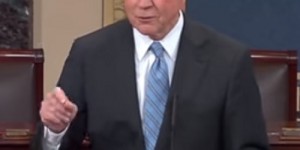The Washington Examiner — Now that Republicans are poised to take control of both chambers of Congress, their conservative base will be expecting GOP leaders to take immediate and decisive action to block President Obama’s recent executive action on immigration.
They may end up disappointed.
Republican leaders in both the House and Senate pledged in December that while they could do little in a divided Congress to stop Obama’s immigration directive in 2014, January would bring them new powers to block the move because Republicans will take control of the upper chamber.
“Congress will act,” incoming Senate Majority Leader Mitch McConnell promised in a floor speech.
But McConnell and other Republican leaders, eager to win the public’s approval over how they run Congress, are wary of instigating a spending battle with the president that could hurt the public’s trust. They want to show they can govern without the threat of a government shutdown.
So they may be reluctant to use spending legislation, which lawmakers tout as “the power of the purse,” to try to stop Obama’s executive action.
“Funding is the single, biggest, most effective tool” to block Obama, Republican Sen. John Cornyn of Texas acknowledged to the Washington Examiner. “But, the president has to sign the bill. So that’s problematic in itself.”
Cornyn, who will become the No. 2 Senate leader in January, said Republican lawmakers may instead begin considering “other ways” to deal with Obama’s executive action, such as a vote on a tough border security measure.
“Our range of choices,” Cornyn said, “are not all that high.”
But a move to defund the executive action is exactly what conservatives are expecting, particularly in the House, where dozens of GOP lawmakers protested the $1.1 trillion spending bill that passed in December because it didn’t block Obama’s executive action.
Obama on Nov. 20 announced he will stop the deportation of more than 5 million illegal immigrants and allow them to obtain work permits and Social Security numbers that will eventually make them eligible for federal benefits.
Conservatives immediately clamored for the GOP to block money the federal government will need to carry out Obama’s order.
But GOP leaders persuaded them to wait until the new year.
Conservatives tell the Examiner they plan to hold the GOP leadership accountable for that promise.
“The expectation is there’s going to be a fight,” Rep. Doug Collins, R-Ga., told the Examiner. “The leadership has made a commitment to pull this back.”
As part of the spending deal Congress approved in December, the two parties agreed to fund the Department of Homeland Security in a short-term measure that expires Feb. 27.
When that bill expires, conservatives say they expect GOP leaders to agree to a new DHS spending measure that either strips out funding for Obama’s immigration directive or includes a provision banning the federal government from carrying it out.
“My own hope,” said Rep. Trent Franks, R-Ariz., “is that we will fund the Department of Homeland Security’s legitimate responsibilities while defunding [the] unconstitutional executive order the president has signed.”
On the House side, GOP leaders aren’t backing away from their December pledge to conservatives, although they say no decisions have been made.
“Republicans are likely to include a measure to stop the president’s action on the homeland funding bill,” a top House Republican aide told the Examiner.
That’s all but guaranteed to prompt a veto fight with the president, and Republicans do not control enough votes in the House or Senate to override a veto.
With the exception of a handful of Senate conservatives, including Sens. Ted Cruz of Texas and Mike Lee of Utah, most Republicans in the Senate have little appetite for a spending showdown with the president.
Sen. John Barrasso, R-Wyo., a member of the GOP leadership team, isn’t ruling out the defunding route and said it’s under consideration. But he acknowledged that while Republicans will have 54 votes in January, they aren’t enough to block a potential Democratic filibuster.
Republicans, Barrasso said, also plan to address Obama’s executive action in other ways, such as the upcoming nomination hearings and vote on Loretta Lynch, Obama’s pick to succeed Attorney General Eric Holder.
“It’s going to be a big part of those hearings,” Barrasso said.




























